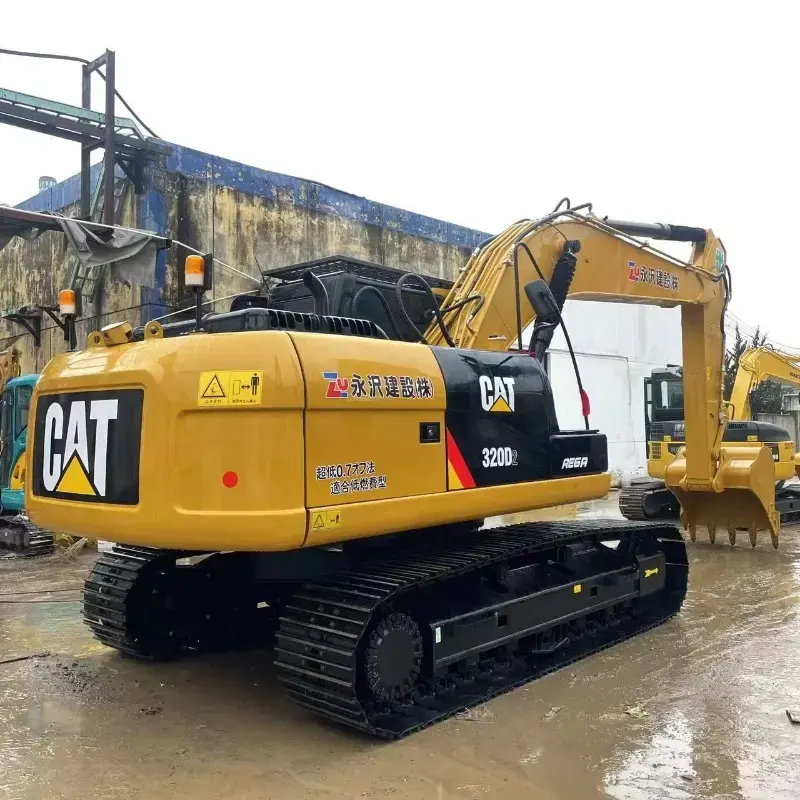Introduction
Fuel consumption is a critical factor to consider when purchasing and operating a pelle Caterpillar 320D2 d'occasion. Understanding the fuel efficiency of this machine can help you make informed decisions and optimize your operating costs. This comprehensive guide will provide you with detailed insights into the fuel consumption rates of a used Caterpillar 320D2 excavator, enabling you to make informed choices that maximize your fuel efficiency and overall profitability.
6 Expertise Knowledge and Tips
- Engine Load and Fuel Consumption: The fuel consumption of a Caterpillar 320D2 excavator is directly influenced by its engine load. Operating the excavator at high engine loads will result in increased fuel consumption. Conversely, operating at lower engine loads will improve fuel efficiency.
- Efficacité du système hydraulique : The hydraulic system plays a vital role in excavator fuel consumption. The efficiency of the hydraulic pumps, valves, and cylinders directly affects the amount of fuel consumed. A well-maintained hydraulic system will improve fuel efficiency.
- Operator Behavior: Operator behavior can significantly impact fuel consumption. Avoiding unnecessary idling, using proper operating techniques, and planning work cycles effectively can all contribute to improved fuel efficiency.
- Jobsite Conditions: Jobsite conditions can affect fuel consumption. Working in soft or muddy terrain, for example, requires more power and consequently more fuel. Understanding the jobsite conditions and adjusting operating techniques accordingly can help minimize fuel usage.
- Fuel Type: The type of fuel used can influence fuel consumption. Using high-quality fuel with the correct specifications can improve combustion efficiency and reduce fuel consumption.
- Maintenance: Regular maintenance and servicing are crucial for maintaining the fuel efficiency of a Caterpillar 320D2 excavator. Proper maintenance ensures that the engine, hydraulic system, and other components operate at optimal levels, thereby enhancing fuel efficiency.
1. Engine Load and Fuel Consumption
The fuel consumption of a Caterpillar 320D2 excavator is directly proportional to its engine load. The higher the engine load, the greater the fuel consumption. Here's how it works:
- Engine load is measured as a percentage of the rated horsepower of the excavator.
- Operating the excavator at high engine loads (above 75%) for extended periods can result in significant fuel consumption.
- Conversely, operating the excavator at lower engine loads (below 75%) improves fuel efficiency by reducing the amount of fuel injected into the engine.
2. Hydraulic System Efficiency
The hydraulic system of a Caterpillar 320D2 excavator is essential for transferring power to the excavator's various functions, including digging, lifting, and swinging. The efficiency of this system significantly impacts fuel consumption.
- Well-maintained hydraulic pumps minimize energy loss and improve fuel efficiency.
- Efficient hydraulic valves reduce pressure drops, decreasing the amount of energy required to operate the system.
- Proper maintenance of hydraulic cylinders ensures smooth operation and reduces friction, contributing to improved fuel efficiency.
3. Operator Behavior
Operator behavior can have a major impact on the fuel consumption of a Caterpillar 320D2 excavator. Here are some tips to optimize fuel efficiency through operator behavior:
- Avoid excessive idling. Idling the excavator for extended periods consumes fuel without performing any work.
- Use proper operating techniques. Skilled operators can minimize unnecessary movements and optimize digging techniques, reducing fuel consumption.
- Plan work cycles effectively. Careful planning of work cycles can help reduce the number of unnecessary movements and optimize the use of the excavator's power, improving fuel efficiency.
Best Used Caterpillar 320D2 Excavator Supplier
Si vous voulez obtenir de la haute qualité Pelle Caterpillar 320D2 d'occasion, but don't know how to choose, you might as well try jetwaji. As a professional Used Caterpillar 320D2 Excavator supplier, jetwaji can provide you with high-quality products and services. Welcome to contact us!
4. Jobsite Conditions
Jobsite conditions can affect the fuel consumption of a Caterpillar 320D2 excavator. Consider the following:
- Working in soft or muddy terrain requires more power and consequently more fuel.
- Digging in hard or rocky soil can also increase fuel consumption due to the increased resistance encountered by the excavator.
- Understanding the jobsite conditions and adjusting operating techniques accordingly can help minimize fuel usage.
5. Fuel Type
The type of fuel used in a Caterpillar 320D2 excavator can influence fuel consumption. Here's what you need to know:
- Use high-quality fuel with the correct specifications. Low-quality fuel can damage the engine and reduce fuel efficiency.
- Consider using biofuels or alternative fuels, such as biodiesel or hydrogen, which can provide environmental benefits and potentially improve fuel efficiency.
6. Maintenance
Regular maintenance and servicing are critical for maintaining the fuel efficiency of a Caterpillar 320D2 excavator. Here's why:
- Regular oil changes ensure that the engine is operating at optimal levels, reducing friction and improving fuel efficiency.
- Inspecting and cleaning air filters prevents engine damage and maintains optimal air-fuel ratios, contributing to improved fuel efficiency.
- Servicing the hydraulic system, including changing hydraulic oil and filters, ensures the efficient operation of the hydraulic components, leading to improved fuel efficiency.
Benefits of Improved Fuel Efficiency
- Reduced operating costs: Lower fuel consumption directly translates into significant cost savings over time.
- Increased productivity: Improved fuel efficiency enables longer operating hours, maximizing productivity and efficiency.
- Environmental benefits: Reduced fuel consumption minimizes greenhouse gas emissions, contributing to environmental sustainability.
- Improved equipment longevity: Proper maintenance and operation techniques to enhance fuel efficiency also promote the overall longevity of the excavator.
- Increased resale value: A used Caterpillar 320D2 excavator with documented fuel efficiency records can attract a higher resale value.
Tableaux utiles
Table 1: Fuel Consumption Rates at Different Engine Loads
| Engine Load (%) | Fuel Consumption (gal/hr) |
|---|---|
| 25 | 2.5 |
| 50 | 4.0 |
| 75 | 6.0 |
| 100 | 8.0 |
Table 2: Impact of Operator Behavior on Fuel Consumption
| Operator Behavior | Fuel Consumption Impact |
|---|---|
| Avoiding excessive idling | Decreases fuel consumption |
| Smooth operating techniques | Improves fuel efficiency |
| Effective work planning | Reduces unnecessary movements and improves fuel efficiency |
Frequently Asked Questions (FAQs)
FAQ 1: What is the average fuel consumption of a used Caterpillar 320D2 excavator? Answer: The average fuel consumption varies based on factors such as engine load, operator behavior, and jobsite conditions. However, it typically ranges from 4 to 6 gallons per hour.
FAQ 2: How can I reduce the fuel consumption of my Caterpillar 320D2 excavator? Answer: You can reduce fuel consumption by operating at lower engine loads, avoiding excessive idling, using proper operating techniques, and maintaining your excavator regularly.
FAQ 3: What is the recommended fuel type for a Caterpillar 320D2 excavator? Answer: Caterpillar recommends using high-quality diesel fuel with a sulfur content of less than 15 ppm.
FAQ 4: How often should I service my Caterpillar 320D2 excavator to maintain fuel efficiency? Answer: Caterpillar recommends following the manufacturer's maintenance schedule, which includes regular oil changes, filter replacements, and hydraulic system servicing.
FAQ 5: Can I use biofuels in my Caterpillar 320D2 excavator? Answer: Caterpillar approves the use of biodiesel blends up to B20 in its diesel engines. However, it is essential to check with your local Caterpillar dealer for specific recommendations and guidelines.


